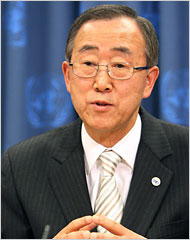 Article source: http://topics.nytimes.com/top/reference/timestopics/people/b/ban_ki_moon/index.html
Article source: http://topics.nytimes.com/top/reference/timestopics/people/b/ban_ki_moon/index.html
Ban Ki-moon was sworn in as the eighth secretary general of the United Nations in December 2006. He succeeded Kofi Annan of Ghan. In June 2011, the White House endorsed Mr. Ban for a second term, helping assure his re-election.
Mr. Ban, a former foreign minister for South Korea, has led the United Nations through crises involving Libya and Ivory Coast. The decision by the United Nations Security Council to authorize military action to protect civilians in Libya led to a large-scale aerial operation on the part of NATO and the United States in support of the rebels who eventually overthrew Col. Muammar al-Qaddafi.
But the United Nations has had a harder time responding to the uprising in Syria. Mr. Annan, who was appointed the joint United Nations-Arab League envoy to Syria in February, negotiated a cease-fire peace plan in April 2012 with the government of President Bashar al-Assad. But government forces continued their attacks, and by August the United Nations declared that it was withdrawing the team of observers it had sent to Syria. The Security Council split repeatedly, with China and Russia blocking calls for stronger action, in part because of their anger over the expansive use made of the council’s resolution authorizing force to protect civilians in Libya.
Mr. Ban has generally kept a modestly low profile. But in February 2012, he publicly castigated Syria’s government, accusing it of committing atrocities against Syrian civilians, including children.
Controversial Attendance at a Summit Meeting in Iran
Mr. Ban drew attention in late August 2012 when it was announced that he would attend a summit meeting in Tehran that Iran had trumpeted as a vindication of its defiance and enduring importance in world affairs. Mr. Ban’s decision to attend the meeting, which included officials from 120 countries, came despite objections from the Americans and Israelis.
Mr. Ban’s decision to participate, which might have gone nearly unnoticed in other years, was particularly fraught because of the tensions surrounding the host country. Iran has defied United Nations Security Council resolutions to halt its uranium enrichment and has strongly supported the Syrian government’s sharp repression of an armed uprising, a crackdown that Mr. Ban has repeatedly condemned.
Mr. Ban has also castigated the anti-Semitic statements and calls for Israel’s destruction made recently by Iranian leaders, reminding them that the United Nations Charter prohibits one member from threatening the existence of another.
But many diplomats and others said it would have been extraordinarily difficult for Mr. Ban not to go. The 120 countries at the summit represent the biggest single voting bloc in the 193-member General Assembly at the United Nations.
In his remarks at the summit, Mr. Ban denounced the repression of the armed uprising in Syria, a close Iranian ally. Mr. Ban added further embarrassment to the Iranian hosts by publicly upbraiding them in his speech for threatening to annihilate Israel and for describing the Holocaust as a politically motivated myth.
In addition, Mr. Ban called upon Iran to comply with a set of five Security Council resolutions demanding that the country stop enriching uranium.
Background
Mr. Ban’s selection to head the global organization had particular resonance in his country, which was created by the United Nations in 1948 and defended by United Nations-authorized troops in the Korean War.
Mr. Ban was born on June 13, 1944, in Eumseong, a farm village in Japanese-occupied Korea, and raised in Chungju, a nearby town. When he was 6, his family fled to a remote mountainside to escape the fighting during the Korean War. It was during the war that he saw his first Americans, soldiers who would throw biscuits and chocolates and gum to Korean children.
The eldest of six children, Mr. Ban worked hard at learning English in school. In 1962, he won a Red Cross-sponsored English competition, which earned him a trip to the United States. During that trip, he visited the White House, where his group met with President John F. Kennedy. Mr. Ban said the meeting inspired him to become a diplomat.
He spent three decades as a foreign service officer, serving as a top official in the Korean Embassy in New Delhi and ambassador to Austria. He was first secretary at the South Korean mission to the United Nations beginning in 1978, and became his country’s foreign minister in January 2004.
In contrast to the globetrotting and voluble Mr. Aman, Mr. Ban is known for his quiet demeanor and desire not to offend, once even writing letters of apology to 120 Foreign Ministry officials after being promoted ahead of them.
In a speech to the United Nations, when he was chosen as the new secretary general, Mr. Ban asked people to understand that his low-key style came more from his culture’s emphasis on discreetness, than a lack of decisiveness.
‘‘Asia is a region where modesty is a virtue,’’ he said.
‘‘But the modesty is about demeanor,’’ he said, ‘‘not about vision and goals. It does not mean the lack of commitment or leadership. Rather it is quiet determination in action to get things done without so much fanfare.’’
My opinion
As you know, Ki-moon Ban is a famous diplomat representive of South Korea. Also he became eighth secretary general of the United Nations. As a Korean, I am very proud of him. When I see article about him, I am very pleased. Actually my another role model is Ki-moon Ban. I also read his autobiography and I was so impressive and I really admired him. He has showed endless effort attitude in his life. He deserves respect from many peolple. I want to be a great diplomat like Ki-moon Ban, who lead this world as a diplomat.
